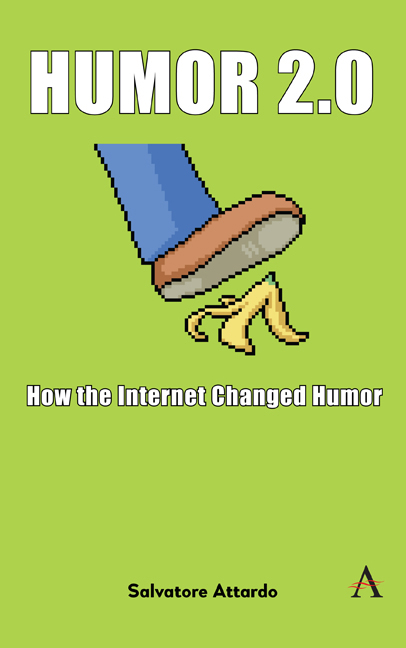19 - “Hard to Watch”: Cringe and Embarrassment Humor
Published online by Cambridge University Press: 28 February 2024
Summary
Consider the following jokes. The first is by Sarah Silverman
(1) “I was raped by a doctor, (…) Which is so bittersweet for a Jewish girl.” (quoted in Goodyear, 2005)
The second involves Tig Notaro and Natasha Leggero. A little background is necessary: in 2013, Leggero hosted a self-produced show on YouTube called “Tubbing with Tash” in which she “interviewed” comedians in her hot tub. In the following video
https://youtu.be/8YNtDkgxNG0
(2) Tig Notaro is sitting, fully clothed in a brown suit, in the tub, while Leggero and the other people present are wearing swimsuits. Leggero wears a bikini. Around 1:23, Leggero says: “I wanted you to wear a bikini.” Notaro, pointing to her suit, says: “Close enough” and takes off the suit jacket. Leggero continues: “We’re trying to get a lot of hits on this.”
This may seem like an innocuous, if somewhat odd, exchange (why would Notaro wear a suit in a hot tub?). However, the video was posted October 30, 2013. Notaro had been diagnosed with breast cancer in 2012 and had had a double mastectomy without reconstructive surgery.
I think that it is unnecessary to explain why considering rape “bittersweet” and asking a cancer survivor who has undergone a double mastectomy to wear a bikini in order to get more hits on YouTube is cringeworthy. These two examples have the advantage of being very short, but we will also examine part of an episode of the American version of the sitcom The Office, below. First however, we need to define “cringe humor” also known as “embarrassment humor.”
We live in the “age of cringe” (Schwanebeck, 2021). Schwanebeck puts the beginning of the age of cringe as the early 2000s. Of course, awkwardness has existed since Adam and Eve had to cover themselves up—that's not the point. The point is that awkwardness, embarrassment and cringe are one of the defining themes of humor from the 2000s onward.
Cringe humor is defined as humor in which the hearer experiences vicarious embarrassment on behalf of one or some of the participants in the humor (Hye-Knudson, 2018; Schwanebeck, 2021).
- Type
- Chapter
- Information
- Humor 2.0How the Internet Changed Humor, pp. 189 - 196Publisher: Anthem PressPrint publication year: 2023

